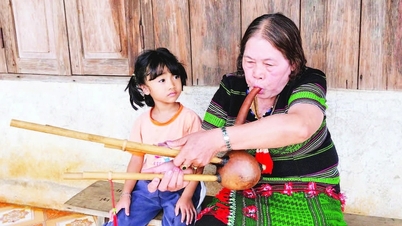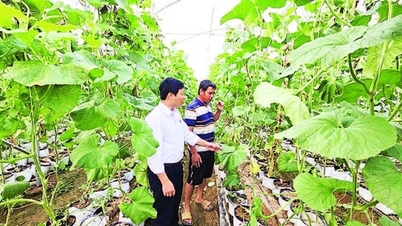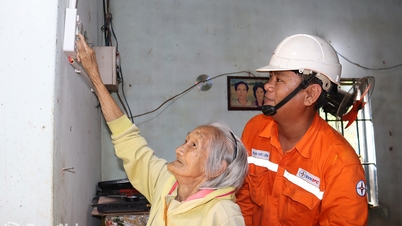 |
| Students at Nguyen An Ninh Primary School (Tam Hiep Ward, Dong Nai Province) wash their hands with soap before eating in the school's boarding program. Photo: Hanh Dung |
Especially in the context of the current increase in the risk of several infectious diseases, washing hands properly with soap at the right time is not only a personal hygiene habit but also a "shield" that effectively helps prevent some dangerous diseases.
Develop good habits
The habit of washing hands with soap has been maintained by Ms. Tran Thi Lieu's family (residing in Trang Dai ward, Dong Nai province) for many years. Especially since the outbreak of the Covid-19 pandemic, Ms. Lieu has paid particular attention to washing her hands with soap.
"I regularly remind my husband, children, and family members to wash their hands with soap before eating, after using the toilet, or after coming home from outside. As a result, everyone in the family has been doing a good job of removing bacteria from their hands and avoiding touching their eyes, nose, and mouth," said Ms. Lieu.
According to the World Health Organization (WHO), washing hands with soap can reduce the risk of diarrheal diseases by up to 35% and the risk of acute respiratory infections by 45%. This is one of the simplest, least expensive, yet highly effective disease prevention measures.
Not only in families but also in many schools throughout the province, from the moment students enter first grade, teachers instruct them on how to wash their hands properly and thoroughly. This helps form good habits that students will continue to practice at home.
In healthcare facilities, doctors and nurses strictly adhere to handwashing with soap or disinfectant solutions before each procedure or order related to patients. In particular, before entering the operating room, doctors perform all necessary handwashing steps to ensure patient safety.
According to the World Health Organization (WHO), hands come into direct contact with countless surfaces and objects every day, making them easy carriers of bacteria and viruses. Washing hands with soap helps remove most germs, reducing the risk of transmission to oneself and others. Especially during epidemics, proper handwashing is a crucial measure to prevent diseases such as influenza, COVID-19, hand, foot and mouth disease, and acute diarrhea.
In fact, studies have shown that in schools, when children are instructed to wash their hands regularly with soap, the number of cases of hand, foot and mouth disease, intestinal diseases, and other infectious diseases decreases significantly. In hospitals, adherence to hand hygiene by healthcare workers also significantly reduces cross-infection during examinations and treatments.
Effective disease prevention
According to recommendations from the World Health Organization (WHO) and the Ministry of Health, there are five important times when everyone should wash their hands with soap. These are: before preparing food; before eating or feeding children; after using the toilet; after caring for a sick person; and after contact with waste, garbage, or animals.
In addition, it is necessary to wash hands when they are dirty, after coughing or sneezing, when returning home from public places, or after touching money, doorknobs, and telephones, which are potential breeding grounds for germs.
Ms. Huynh Tu Anh, Deputy Head of the Professional Affairs Department (Dong Nai Department of Health), emphasized: To achieve high effectiveness, handwashing time should last at least 20 seconds with all 6 steps as guided by the Ministry of Health, including: scrubbing the palms, backs of the hands, between the fingers, fingernails, fingertips, thumbs, and wrists. Using soap or alcohol-based disinfectant (if soap and clean water are unavailable) is mandatory to kill and eliminate bacteria and viruses.
Ms. Huynh Tu Anh shared: "The habit of washing hands with soap, though small and simple, has a huge impact, effectively preventing diseases. Of course, this habit cannot be formed overnight; it requires guidance and regular reminders from family, school, and society. Parents are the first and most important people to help young children learn how to wash their hands properly, turning this action into a natural daily reflex."
In addition, each individual needs to raise their awareness of self-protection and community protection by washing hands frequently and not hesitating to remind others when they forget. Agencies, units, and schools need to maintain adequate facilities such as handwashing sinks, soap, and clean water to create favorable conditions for everyone to practice.
Hanh Dung
Source: https://baodongnai.com.vn/dong-nai-cuoi-tuan/202510/rua-tay-voi-xa-phong-chuyen-nho-y-nghia-lon-8bf3f0d/


![[Photo] Prime Minister Pham Minh Chinh holds a phone call with the CEO of Russia's Rosatom Corporation.](/_next/image?url=https%3A%2F%2Fvphoto.vietnam.vn%2Fthumb%2F1200x675%2Fvietnam%2Fresource%2FIMAGE%2F2025%2F12%2F11%2F1765464552365_dsc-5295-jpg.webp&w=3840&q=75)


![[Photo] Closing Ceremony of the 10th Session of the 15th National Assembly](/_next/image?url=https%3A%2F%2Fvphoto.vietnam.vn%2Fthumb%2F1200x675%2Fvietnam%2Fresource%2FIMAGE%2F2025%2F12%2F11%2F1765448959967_image-1437-jpg.webp&w=3840&q=75)


















![[Infographic] Preventing students from making their own firecrackers: 7 things parents need to know](https://vphoto.vietnam.vn/thumb/402x226/vietnam/resource/IMAGE/2025/12/11/1765466656703_img_0320_20251211183542.jpeg)






![[Photo gallery] Long Thanh Airport 'lights up' ready to welcome its first flight](https://vphoto.vietnam.vn/thumb/402x226/vietnam/resource/IMAGE/2025/12/11/1765467251707_bia_20251211222704.jpeg)




![[Infographic] Personal Income Tax Law 2025: How much tax will employees pay?](https://vphoto.vietnam.vn/thumb/402x226/vietnam/resource/IMAGE/2025/12/11/1765445652282_9abd1bf33581badfe390_20251211152612.jpeg)























![[OFFICIAL] MISA GROUP ANNOUNCES ITS PIONEERING BRAND POSITIONING IN BUILDING AGENTIC AI FOR BUSINESSES, HOUSEHOLDS, AND THE GOVERNMENT](https://vphoto.vietnam.vn/thumb/402x226/vietnam/resource/IMAGE/2025/12/11/1765444754256_agentic-ai_postfb-scaled.png)


















































Comment (0)